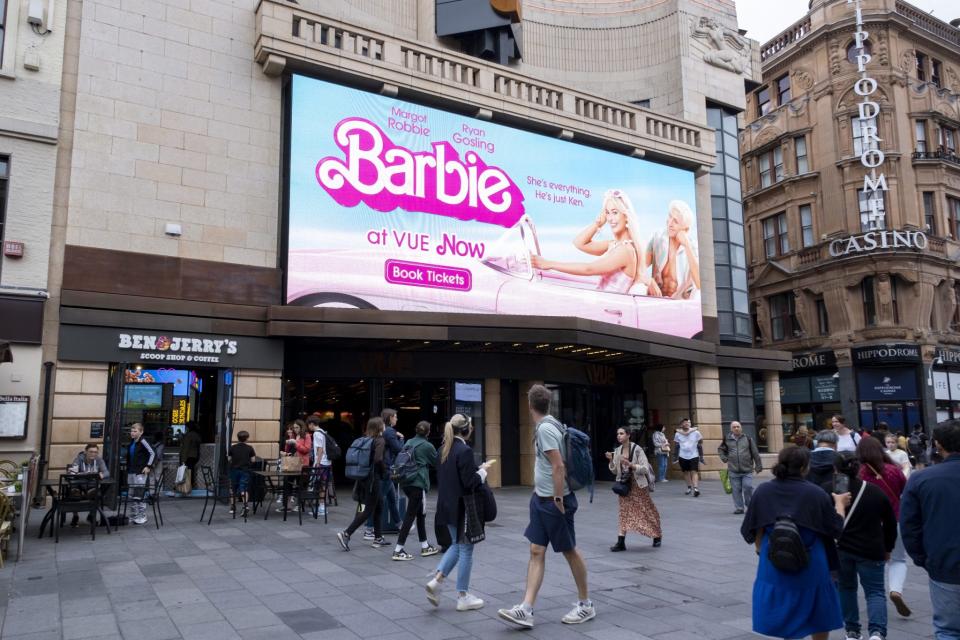Barbie movie added close to $100 million to the struggling British economy

Barbie is more than 2023’s biggest blockbuster movie and cultural zeitgeist—the iconic doll-turned-movie star is now being credited with boosting Britain’s sluggish economy.
The music-anticipated film starring Margot Robbie as Barbie and Ryan Gosling as Ken has contributed more than $99 million (£80 million) to the U.K. economy thanks to the hiring of more than 6,000 extras, creation of 685 jobs, and patronage of more than 750 local businesses.
Greta Gerwig’s movie about the Mattel doll is Warner Bros' most successful theatrical release of all time, leapfrogging Harry Potter and the Deathly Hallows: Part II, The Dark Knight Rises and Joker to the top spot.
In the U.K. box office alone, it generated more than $118 million (£95 million), Warner Bros recently revealed while giving evidence to the U.K. parliament.
While Barbieland was designed to look like a pink fantasy toy town in California’s Venice Beach, much of the set was built and shot in the U.K. at the Warner Bros studios just north of London.
The U.K. is Warner Bros’ largest base outside the U.S
“During its production in the U.K., [Barbie] contributed over £80 million in direct spend to the local economy, created 685 jobs, involved over 6,000 extras, supported 754 local businesses, paid over £40 million in local wages,” Warner Bros. Discovery told the U.K. government in response to a consultation about film and high-end TV production. “The benefit of attracting such productions are that they are net positive for the U.K.”
Other major film studies like Paramount and Amazon have also given evidence as part of a call for targeted tax support and changes to regulations impacting the British film industry.
Warner Bros also revealed in the inquiry that the U.K. is the company's largest base outside the U.S., with over 4,000 permanent staff.
As well as being home to Barbie's Dreamhouse the 200-acre site in Leavesden, Hertfordshire is also being used to film the forthcoming Wonka, inspired by Roald Dahl's Charlie & The Chocolate Factory and starring Timothée Chalamet.
Warner Bros is now to expand its studio’s capacity by more than 50% by 2027, turning it into the primary production hub for all future DC Studios films, including the Batman franchises. The company says another 4,000 jobs will be created in the process and $248 million (£200 million) will be contributed to the U.K. economy.
Women are shaping the economy
It’s not only Barbie that’s given economies—and retailers like Zara—a much-needed boost; This summer, Taylor Swift and Beyoncé went on tour for the first time since 2018 and it sent fans into a frenzy.
Tickets for a seat at Swift’s Eras Tour were fetching upwards of $35,000 on reselling sites like StubHub and Viagogo; Beyoncé fans flew across the globe from Dallas to Stockholm to land a seat at Beyoncé’s Renaissance World Tour; Meanwhile, some desperate fans were even sneaking into their concerts by bagging security gigs.
Even tickets to watch the movie of Swift’s concert—instead of the real deal—has helped AMC notch its highest-ever single-day ticket revenue in its 103-year history.
Experts originally cautioned that the surge of fans going to extreme measures to see the pop icons perform was keeping inflation stubbornly high.
However, Morgan Stanley recently estimated that the female powerhouses added around $5.4 billion to the U.S. economy in Q3—to put that figure into context, Swift and Beyoncé have had a greater economic impact than the 2008 Olympics did for Beijing.
This story was originally featured on Fortune.com

 Yahoo Finance
Yahoo Finance 